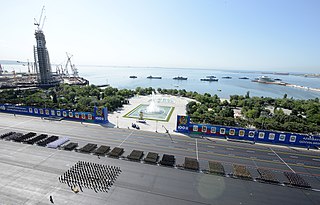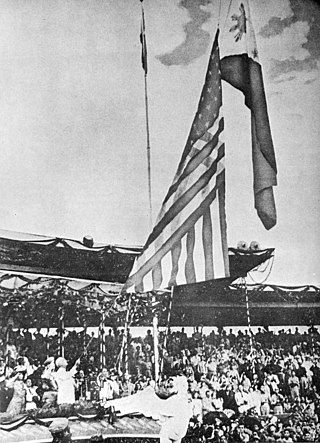Related Research Articles
April is the fourth month of the year in the Gregorian and Julian calendars. Its length is 30 days.

August is the eighth month of the year in the Julian and Gregorian calendars. Its length is 31 days.

December is the twelfth and final month of the year in the Julian and Gregorian calendars. Its length is 31 days.
January is the first month of the year in the Julian and Gregorian calendars. Its length is 31 days. The first day of the month is known as New Year's Day. It is, on average, the coldest month of the year within most of the Northern Hemisphere and the warmest month of the year within most of the Southern Hemisphere. In the Southern hemisphere, January is the seasonal equivalent of July in the Northern hemisphere and vice versa.
July is the seventh month of the year in the Julian and Gregorian calendars. Its length is 31 days. It was named by the Roman Senate in honour of Roman general Julius Caesar in 44 B.C., being the month of his birth. Before then it was called Quintilis, being the fifth month of the calendar that started with March.

May is the fifth month of the year in the Julian and Gregorian calendars. Its length is 31 days.

October is the tenth month of the year in the Julian and Gregorian calendars. Its length is 31 days. The eighth month in the old calendar of Romulus c. 750 BC, October retained its name after January and February were inserted into the calendar that had originally been created by the Romans. In Ancient Rome, one of three Mundus patet would take place on October 5, Meditrinalia October 11, Augustalia on October 12, October Horse on October 15, and Armilustrium on October 19. These dates do not correspond to the modern Gregorian calendar. Among the Anglo-Saxons, it was known as Winterfylleth (Ƿinterfylleþ), because at this full moon, winter was supposed to begin.
Fiestas Patrias in Mexico originated in the 19th century and are observed today as five public holidays.

Columbus Day is a national holiday in many countries of the Americas and elsewhere, and a federal holiday in the United States, which officially celebrates the anniversary of Christopher Columbus's arrival in the Americas. He went ashore at Guanahaní, an island in the Bahamas, on October 12, 1492 [OS]. On his return in 1493, he moved his coastal base of operations 70 miles east to the island of Hispaniola, what is now the Dominican Republic and established the settlement of La Isabela, the first permanent Spanish settlement in the Americas.

Europe Day is a day celebrating "peace and unity in Europe" celebrated on 5 May by the Council of Europe and on 9 May by the European Union.

Public holidays in the Philippines are of two types: regular holidays and special non-working days.

Several nations observe or have observed a Navy Day to recognize their navy.

An Armed Forces Day, alongside its branch-specific variants often referred to as Army or Soldier's Day, Navy or Sailor's Day, and Air Force or Aviator's Day, is a holiday dedicated to honoring the armed forces, or one of their branches, of a sovereign state, including their personnel, history, achievements, and perceived sacrifices. It's often patriotic or nationalistic in nature, carrying propaganda value outside of the conventional boundaries of a military's subculture and into the wider civilian society. Many nations around the world observe this day. It is usually distinct from a Veterans or Memorial Day, as the former is dedicated to those who previously served and the latter is dedicated to those who perished in the fulfillment of their duties.

Philippine Republic Day, also known as Philippine–American Friendship Day, is a commemoration in the Philippines held annually on July 4. It was formerly an official holiday designated as Independence Day, celebrating the signing of the Treaty of Manila, which granted Philippine independence from the United States of America in 1946.

The following are the national public holidays and other observances of Argentina.

Public holidays in Italy are established by the Italian parliament and, with the exception of city or community patronal days, apply nationwide. These include a mix of national, religious and local observances. As for Whit Monday, there is an exception for South Tyrol. In Italy there are also State commemoration days, which are not public holidays.
Freedom Day may refer to any of the following days:

Friendship Day is a day in several countries for celebrating friendship. It was initially promoted by the greeting card industry; evidence from social networking sites shows a revival of interest in Friendship Day that may have grown with the spread of the internet, particularly in India, Bangladesh, and Malaysia. Mobile phones, digital communication, and social media have contributed to popularize the custom. Those who promote the day in South Asia attribute the tradition of dedicating a day in honour of friends to have originated in the United States in 1935.
Heroes' Day or National Heroes' Day may refer to a number of commemorations of national heroes in different countries and territories. It is often held on the birthday of a national hero or heroine, or the anniversary of their great deeds that made them heroes.

The Unification Act was an agreement signed by the Ukrainian People's Republic and the West Ukrainian People's Republic in St Sophia Square in Kyiv on 22 January 1919. Since 1999, it is celebrated every year as the Day of Unity of Ukraine to commemorate the signing of the treaty; it is a state holiday in Ukraine; though not a public holiday.
References
- ↑ Calendar, National Day (2014-04-01). "NATIONAL ADMINISTRATIVE PROFESSIONALS DAY - Wednesday of Last Full Week in April". National Day Calendar. Retrieved 2023-11-27.
- ↑ Hamilton, Lisa. "Administrative Professionals Day". International Business and Management Career College. Retrieved April 8, 2019.
- ↑ "The Skinny on Administrative Professionals Day". Happy Worker. Retrieved April 8, 2019.
- ↑ National Secretaries Day, Professional Association for Secretaries and Administrative Assistants, archived from the original on October 29, 2013, retrieved April 2, 2016
- ↑ Castro, Shislane Vitória (2022-09-09). "9 de setembro é o Dia do Administrador". Assembleia Legislativa de Sergipe (in Brazilian Portuguese). Retrieved 2023-11-27.
- ↑ BRAZIL, Câmara dos Deputados. Datas Comemorativas Archived 21 January 2013 at the Wayback Machine . March 2003.
- ↑ "Happy Friendship Day 2019: Why do we celebrate 'friendship day'?". Jagran English. 2 August 2019. Retrieved 12 July 2020.
- ↑ "Friendship day 2019: History, significance of the day when people commemorate bonds that turned strangers into friends". Firstpost. 3 August 2019. Retrieved 12 July 2020.
- ↑ "Dia del amigo. ¿Qué países lo celebran el 20 de julio?". La Nación (in Spanish).
- ↑ "Día del amigo: la historia del argentino qu propuso festejarlo el 20 de julio" (in Spanish). 20 July 2019.
- ↑ "Los teléfonos de saturaron por los saludos del día del amigo".
- ↑ "Friendship day: Do it with Friendship sms or Friendship quotes".
In India the Friendship Day will be celebrated on August 7, 2011.
- ↑ "Freedom Day in Equatorial Guinea in 2021". Office Holidays. Retrieved January 4, 2021.